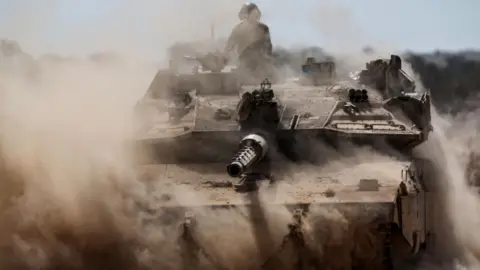### Israel Mobilizes Reservists for Gaza City Offensive
In a significant military maneuver, the Israeli Defense Forces (IDF) have announced the mobilization of approximately 60,000 reservists as part of their preparations for an impending ground offensive targeting Gaza City. This announcement highlights the seriousness of the situation and the Israeli government’s commitment to achieving its military objectives in the ongoing conflict with Hamas.
The military operation, aimed at capturing and occupying Gaza City entirely, is set to commence in September. Military officials have indicated that while reservists would be called back into service, the overwhelming majority of the troops involved in the offensive will consist of active-duty personnel. Currently, troops are reported to be actively operating in the Zeitoun and Jabalia regions, as part of the groundwork for the planned offensive.
### Strategic Military Planning
Defense Minister Israel Katz approved the operational plan on Tuesday, which is teed up for deliberation in the security cabinet later this week. As preparations unfold, the military is coordinating with various agencies to prepare civilians in Gaza City for potential evacuation. Hundreds of thousands of Palestinians are expected to be directed to evacuate to designated shelters in southern Gaza, amidst fears of intensified conflict and displacement.
However, the announcement has drawn international concern. Leaders around the world, including French President Emmanuel Macron, have condemned Israel’s planned actions. Macron warned that this escalation could plunge both Palestinian and Israeli societies into a cycle of perpetual conflict, further destabilizing the entire region. The International Committee of the Red Cross has echoed these sentiments, warning that increased displacement and intensified military operations could exacerbate an already catastrophic humanitarian situation for Gaza’s dense population.
### Hostage Situation and Diplomatic Efforts
The decision to escalate military action comes on the heels of failed indirect negotiations between Israel and Hamas regarding a ceasefire and the potential release of hostages. Mediators from Qatar and Egypt have been working tirelessly to broker an agreement that could prevent further deterioration of the situation, even proposing a new 60-day ceasefire in exchange for the liberation of half of the hostages held by Hamas, a plan which was reportedly accepted by the group. Nevertheless, Israel has demanded a comprehensive deal which includes all hostages—an objective made more difficult by the bellicose actions on the ground.
As the military prepares to enforce this operation, Katz asserted that the offensive aims to transform Gaza’s landscape and ensure the military’s control, noting particularly how operations would unfold differently than past engagements.
### Humanitarian Crisis and International Response
With military action imminent, concerns for the humanitarian situation in Gaza are escalating. Various humanitarian organizations have voiced criticisms about the planned military actions, warning of impending catastrophe for those already suffering from severe shortages of essential items like food, clean water, and medicines. The humanitarian agencies cautioned that forcing mass evacuations could amount to forcible transfer, a violation of international law, and predicted that conditions in temporary shelters would be untenable.
Data from the World Food Programme indicates alarming levels of malnutrition in Gaza, worsened by the blockade and military operations. Reports also indicate that since the escalation of hostilities began, serious health and humanitarian challenges have compounded, with the health ministry in Gaza recording an increasing number of malnutrition-related deaths.
### Conclusion
Summarily, the mobilization of reservists and the planned offensive in Gaza City underscore an escalating military situation that promises to exacerbate the tragic humanitarian crisis affecting millions in the region. As internal and external pressures mount, the potential for increased violence remains a significant concern not only for Israelis and Palestinians but for the broader international community witnessing the intricate and devastating complexities of the conflict unfold.












